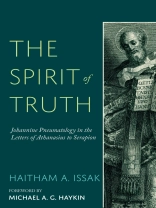The fourth century was different than the previous centuries due to two big heresies. The first one was the heresy of Arius, who denied the divinity of the Son. This heresy led to the Council of Nicaea in 325 in which the church fathers affirmed the divinity of the Son of one substance with the Father. The second heresy was that of the Tropici, who denied the divinity of the Holy Spirit and said that the Holy Spirit was a creature or an angel. At that time, Athanasius was one of the most important leaders in the life of the church. He wrote against the Tropici, as he addressed them in his letters to Serapion. These letters are the major work of Athanasius concerning the Holy Spirit.
The Spirit of Truth explains the way that Athanasius dealt with the heresy and elucidates the pneumatology of Athanasius’s use of the Gospel of John and 1 John. It also discusses Athanasius’s understanding of tradition, Scripture, and hermeneutical principles in his defense of the Godhead, particularly the divinity of the Holy Spirit. For Athanasius, the Holy Spirit is eternal, divine, uncreated, and one with the Father and the Son.
Sobre el autor
Michael A. G. Haykin (Th D, University of Toronto) is professor of church history and biblical spirituality at The Southern Baptist Theological Seminary and director of The Andrew Fuller Center for Baptist Studies. He has authored or edited more than twenty-five books, including Rediscovering the Church Fathers: Who They Were and How They Shaped the Church.







![Portada de Brian Schrag & Julisa Rowe: Community Arts for God's Purposes [Chinese] 貼近神心意的社群藝術 Portada de Brian Schrag & Julisa Rowe: Community Arts for God's Purposes [Chinese] 貼近神心意的社群藝術](https://static.worldofdigitals.com/thumb_webp/740/9781645083740.webp)




